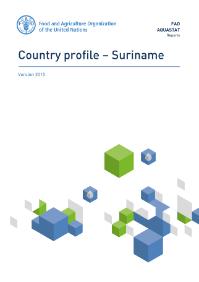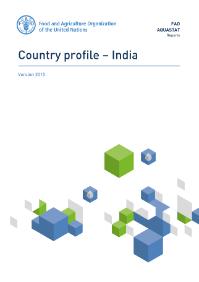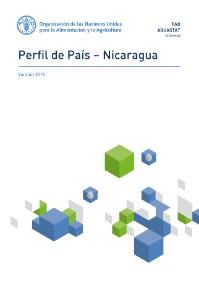Focal point
Location
The Food and Agriculture Organization of the United Nations leads international efforts to defeat hunger. Serving both developed and developing countries, FAO acts as a neutral forum where all nations meet as equals to negotiate agreements and debate policy. FAO is also a source of knowledge and information. We help developing countries and countries in transition modernize and improve agriculture, forestry and fisheries practices and ensure good nutrition for all. Since our founding in 1945, we have focused special attention on developing rural areas, home to 70 percent of the world's poor and hungry people.
Members:
Resources
Displaying 386 - 390 of 5073Country profile – Suriname
This country profile describes the state of the water resources and water use, as well as the state of agricultural water management in Suriname. The aim of this report is to describe the particularities of the country and the problems met in the development of the water resources, and irrigation in particular. Irrigation trends, existing policies and legislation to water use in agriculture, possible treaties and agreements between countries as well as prospects for water management in agriculture are presented, as described in literature.
Essai de présentation des tendances d’évolution du droit pastoral en Afrique de l’Ouest
La présente étude est un e tentative de présentation des tendances d’évolution en Afrique de l’Ouest du droit pastoral en général, et des législations pastorales en part i culier. Elle porte sur un échantillon de pays suivants choisi s uniquement sur la base d’un e grande similitude des règles juridiques et institutionnelles, ainsi qu e des pratiques traditionnelles et coutumières en vigueur: Burkina Faso, Guinée, Mali, Mauritanie, Niger et Sénégal. L’objectif poursuivi est essentiellement la co nnaissance de s grandes tendances actuelles des législations pastorales .
Country profile – India
This country profile describes the state of the water resources and water use, as well as the state of agricultural water management in India. The aim of this report is to describe the particularities of the country and the problems met in the development of the water resources, and irrigation in particular. Irrigation trends, existing policies and legislation to water use in agriculture, possible treaties and agreements between countries as well as prospects for water management in agriculture are presented, as described in literature.
Perfil de País – Nicaragua
Este perfil de país describe el estado de los recursos hídricos y el uso del agua, así como el estado de la gestión del agua agrícola en Nicaragua. El objetivo de esta monografía es describir las particularidades del país y los problemas encontrados en el desarrollo de los recursos hídricos y el riego en particular.
Land and livelihoods making land rights real for India’s rural poor
Land is at the centre of rural lives in India. Land has inherent value, and it creates value. A plot of land can provide a household with physical, financial, and nutritional security, and provide a labourer with a source of wages. Land is a basis for identity and status within a family and community. Land can also be the foundation for political power.











